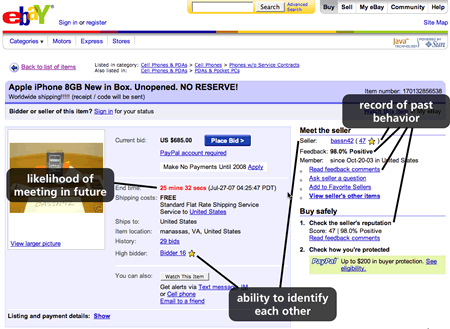Ebay design: Provide Conditions to Cooperate
I gave a talk yesterday at User Interface 12 called “Theory and Practice of Social Design”. It’s an ever-evolving collection of social psychology theory and actual design practice. Here’s one of my favorite slides from the talk…I think it’s a good illustration of how we can use theory to inform our practice, and perhaps vice-versa.
In 1984 Robert Axelrod, who was doing studies on face-to-face groups at the time (no Web!), published a book called The Evolution of Cooperation. In it, he describes three conditions necessary for human cooperation.
- A likelihood of meeting in the future
If people don’t think they’ll meet again in the future, there are no repercussions for not cooperating. Threats of not cooperating are of no use. People will act selfish if there is no future to the relationship. Therefore, the knowledge of future meetings changes our behavior because we feel some level of impending accountability for our actions. - An ability to identify each other
Identity is really important for cooperation because it allows us to know who we’re dealing with. If people can’t identify who they’re dealing with, then they can’t hold that person accountable. This doesn’t mean that we have to know everything about the person, like their address and where they live, it means that they are identified as a person to the system they’re in and the people they’re dealing with. - A record of past behavior
We have learned to assume that the best way to judge future behavior is by looking at past behavior. Thus having a positive record of behavior leads to cooperation. eBay’s seller ratings are a great example of this in action. Sellers accumulate status over time as they do business on the site. Sellers who have a rich transaction history with a high percentage of positive transactions are much more likely to be successful than those with no history.
Here’s a screenshot from eBay showing the presence of the three conditions.
I gave a talk yesterday at User Interface 12 called “Theory and Practice of Social Design”. It’s an ever-evolving collection of social psychology theory and actual design practice. Here’s one of my favorite slides from the talk…I think it’s a good illustration of how we can use theory to inform our practice, and perhaps vice-versa.
In 1984 Robert Axelrod, who was doing studies on face-to-face groups at the time (no Web!), published a book called The Evolution of Cooperation. In it, he describes three conditions necessary for human cooperation.
- A likelihood of meeting in the future
If people don’t think they’ll meet again in the future, there are no repercussions for not cooperating. Threats of not cooperating are of no use. People will act selfish if there is no future to the relationship. Therefore, the knowledge of future meetings changes our behavior because we feel some level of impending accountability for our actions. - An ability to identify each other
Identity is really important for cooperation because it allows us to know who we’re dealing with. If people can’t identify who they’re dealing with, then they can’t hold that person accountable. This doesn’t mean that we have to know everything about the person, like their address and where they live, it means that they are identified as a person to the system they’re in and the people they’re dealing with. - A record of past behavior
We have learned to assume that the best way to judge future behavior is by looking at past behavior. Thus having a positive record of behavior leads to cooperation. eBay’s seller ratings are a great example of this in action. Sellers accumulate status over time as they do business on the site. Sellers who have a rich transaction history with a high percentage of positive transactions are much more likely to be successful than those with no history.
Here’s a screenshot from eBay showing the presence of the three conditions.
A couple of things to note:
- True identity isn’t exposed
Each person’s true identity is never exposed on eBay, so you don’t actually know who you’re dealing with. But you do know the important things: what this person has done within the walls of eBay, whether or not they’re a good member of eBay, and so you can figure out how risky it is dealing with them. This is designed in this way presumably to keep the transaction happening within eBay’s walls. - History of past behavior seems the most important
Of the three conditions, most attention is given to past behavior. This might not be the case on other sites, such as Facebook, where identity seems to be a bigger factor. In fact, Facebook recently gained a little press when they kicked someone off the site for not exposing their true identity.
